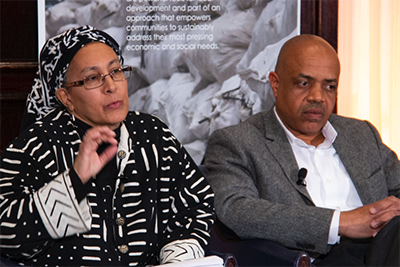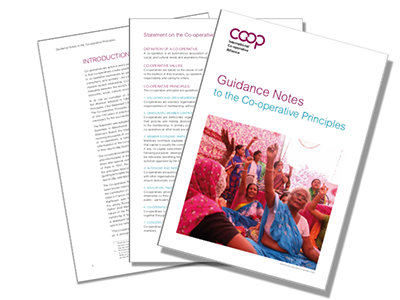“…As it continues to unfold, the history of African American cooperative ownership demonstrates that Black Americans have been successful in creating and maintaining collective and cooperatively owned enterprises that often provided not only economic stability but also developed many types of human and social capital, as well as economic independence. …. The potential is great, and the future of African American cooperatives is wide open – not just to continue on the margins but to flourish more fully. The seeds have been planted.” – Jessica Gordon Nembhard, Collective Courage

Black History Month is an important time to reflect on the contributions of African Americans to the social, cultural and economic success of the United States. It is also an opportunity to consider the contribution of African Americans to the cooperative movement, the role of co-ops in the advancement of Civil Rights, and how we can continue to challenge ourselves to live up to our values and principles.
As part of this celebration, NCBA CLUSA is sharing voices from across the co-op community to present stories, provide examples, challenge convention and support Black cooperators working to build a more inclusive economy.
It has taken profound effort and sacrifice to work against entrenched prejudices in our history and cultivate the inclusive diversity that is key to our country’s special dynamism. Cooperatives have been a crucial strategy for realizing the ideals behind those efforts, building on our longstanding and distinct advantages as a democratic business model, a participatory strategy for achieving inclusive socioeconomic goals, and a movement based in values and principles that speak directly to these challenges. Historically, cooperatives have been used to create access for people with few alternative options, to facilitate economic solidarity, and to provide the social stability that enables greater participation in society.
Along with acknowledging the contributions that cooperatives have made to improving diversity and equity, we need to be clear that more work needs to be done. The fact remains that in many quarters, co-ops can do a better job of ensuring that people who were historically discriminated against are more fully included in representation and leadership of cooperatives. Co-ops can do more to promote economic collaboration, sharing resources to support success across boundaries. One of the key resources we have to look to for guidance are the cooperative principles.

Collectively, the Seven Cooperative Principles emphasize the power of ordinary people to work together to solve shared problems, provide for themselves economically, and to act in solidarity with others. In a very real way, the principles established by the Rochdale Pioneers in 1844 built on and eventually provided legal recognition to social structures that already existed in communities around the world—structures designed to enable people to meet their needs, together. The principles are living concepts and have been regularly assessed by the international cooperative community in the context of the changing world around us, with the most recent revision taking place after extensive consultation in 1995.
Recently, Maurice Smith, chair of the Credit Union National Association’s Board of Directors, continued this ongoing cooperative conversation by inviting people to consider how the notions of diversity and inclusiveness are part of the cooperative principles and proposed that there should be a new principle that focuses exclusively on these critical concepts. Maurice is an accomplished cooperator, currently serving CEO of Local Government Federal Credit Union in Raleigh, NC in addition to his role at CUNA.
In that spirit, at NCBA CLUSA we invite the cooperative community to think more deeply about cooperatives’ role in building more inclusive and equitable communities—and how your cooperative can more fully live out our shared principles.
In that spirit, at NCBA CLUSA we invite the cooperative community to think more deeply about cooperatives’ role in building more inclusive and equitable communities—and how your cooperative can more fully live out our shared principles.
To help inform the conversation, we look to the “Guidance Notes on the Cooperative Principles” released by the International Co-operative Alliance, which serves as the “global steward” of the principles.
The dialog begins with the First Principle, Voluntary & Open Membership, which states “Cooperatives are voluntary organizations, open to all persons able to use their services and willing to accept the responsibilities of membership, without gender, social, racial, political or religious discrimination.” The latest version of the ICA’s Guidance Notes (2015) provide contemporary context for our conversation:
Society has changed since the Co-operative Principles were last re-formulated in 1995. There is a welcome global trend to celebrate human diversity and a growing commitment to the right to equality of treatment for all people. “Without discrimination” in this principle imposes a duty on co-operatives to rise to the challenge of including all people in membership, a challenge that is particularly acute in countries and cultures where discrimination on grounds such as religious belief, ethnicity or race, gender or sexual orientation is a cultural norm…
The Guidance Notes go on to challenge our co-ops to consider how we should act:
Where [cooperatives] encounter prejudice, which manifests itself in exclusivity and discrimination, they should, in the tradition of their founders, challenge it. This should be done, in particular, in every co-operative by the application of the 1st Principle of open membership without discrimination. All co-operatives are encouraged take steps to remove barriers to membership and facilitate the participation of all excluded groups in society.

The theme of inclusion continues in comments related to a number of the other principles. For example, the Notes for the Second Principle, Democratic Member Control, state that:
Members elected to positions of responsibility in a co-operative should broadly reflect the diversity of its membership. If they do not, positive action needs to be taken to encourage men and women from under-represented sections of the membership to stand for election.
The Guidance Notes to the Fifth Principle, Education, Training & Information, state that “[m]ember education must also be accessible to and inclusive of all members, especially those groups of members under-represented in the co-operative’s democratic structures.” While Notes related to the Sixth Principle, Cooperation among Cooperatives, suggest that larger, more established co-ops should take an interest in smaller, start-up cooperatives to show how the business model can thrive in diverse situations. The Notes also point out that cooperatives have long allied themselves with others “working towards social justice and collective human progress.” Finally, the Notes for the Seventh Principle, Concern for Community, make clear that cooperatives have a special role to play in tackling inequality, and that “co-operatives have always made, and continue to make, a major contribution to the progress of civil society and democratic renewal.”
Taken as a whole, the Principles and Guidance Notes make clear that inclusion and non-discrimination is at the very heart of how co-ops operate internally and engage with the wider society. NCBA CLUSA wants to lift up these crucial ideas to invite a deeper conversation about how co-ops can help people build more inclusive businesses and communities.
I encourage all cooperators to take time and think about where we as a movement stand in relation to our ideals and principles. Our combined cooperation can push us further along a path toward creating a truly diverse and inclusive economy, powered by cooperatives.
I encourage all cooperators to take time and think about where we as a movement stand in relation to our ideals and principles. Our combined cooperation can push us further along a path toward creating a truly diverse and inclusive economy, powered by cooperatives.
The opening quote to this article comes from Jessica Gordon Nembhard’s Collective Courage: A History of African American Cooperative Thought and Practice. The book describes the previously and largely unnoticed history of African Americans using the cooperative business model to work for social change and to ensure their autonomy and security in a hostile society. As such, it serves as excellent context for our reflections about cooperatives, inclusion and diversity.
As Gordon Nembhard makes clear in the book, the past is useful because it informs our present and future. We want to hear from you on what that future can and should look like.
NCBA CLUSA intends to be a resource for these conversations. Forums include publications like our weekly newsletter, Co-op Weekly, and the Cooperative Business Journal where opinion pieces and longer-form articles may be published. Contact us at info@ncba.coop and journal@ncba.coop, respectively, to gain further information and send in your ideas. Additionally, our annual Co-op IMPACT Conference in October is the premier event for discussing cooperative trends and issues. This year’s event runs from October 2-4, 2019.
We invite anyone interested to consider submitting programming through a request for proposals (RFP) available here. John Torres, our Vice President of Public Relations & Communications, will be handling the programming this year and welcomes your input. Please contact him at jtorres@ncba.coop.
—Doug O’Brien is president and CEO of NCBA CLUSA, where he works with the cooperative community to deepen its impact on the economy. Greg Irving is a research assistant at NCBA CLUSA.


